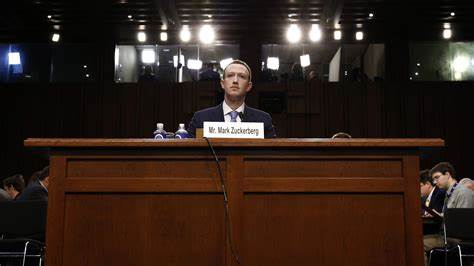by Temitope Oladeji
15/04/2025
On Monday, Meta CEO Mark Zuckerberg took the witness stand in a landmark antitrust trial that could reshape the future of his tech empire.
At the heart of the case is whether Meta, formerly known as Facebook, Zuckerberg, is accused of allegedly illegally monopolizing the social media market by acquiring rising competitors Instagram and WhatsApp more than a decade ago.
The trial, brought by the United States Federal Trade Commission (FTC), marks one of the most significant legal challenges of Big Tech companies in recent years.
If the government prevails, Meta could be forced to be relieved from Instagram and WhatsApp, which are two of the most powerful platforms in the social media ecosystem today.
FTC attorney Daniel Matheson called Zuckerberg as the first witness, seeking to establish that Meta’s acquisitions were calculated moves to eliminate competition.
Central to the government’s case is a series of internal communications suggesting that Zuckerberg viewed Instagram’s rapid growth as a threat and was frustrated by Facebook’s inability to keep pace with another competing photo-sharing platform.
In one exchange highlighted by Matheson, Zuckerberg admitted, “That does seem to be what I’m highlighting,” when asked if his message conveyed concern about Instagram’s explosive growth.
Zuckerberg acknowledged being dissatisfied with Facebook’s efforts to counter Instagram at the time, though he framed it as a routine push for better performance.
However, when pressed later about Instagram’s trajectory, Zuckerberg appeared irritated. “I don’t have the full timeline of Instagram’s development in my head,” he said, adding that someone else might better answer such specific questions.
The FTC also focused on claims that after Meta acquired Instagram, the company initially deprioritized the app in favor of Facebook’s core platform, which Zuckerberg rejected the notion, saying, “In practice, we ended up investing a ton in it after we acquired it.”
During opening arguments, FTC attorney Matheson alleged that Meta used its dominant position to stifle competition while consumer satisfaction declined.
He described Meta’s acquisitions as part of a broader strategy to “erect a moat” around its market power.
Meta’s lead attorney, Mark Hansen, dismissed the FTC’s arguments as speculative and unfounded.
“This lawsuit, in summary, is misguided,” he said. “Any way you look at it, consumers have been the big winners.”
He further argued that Meta operates in a competitive environment and has significantly improved both Instagram and WhatsApp since acquiring them.
The trial is widely seen as a major test of the FTC’s ability to rein in tech giants. The agency originally filed the case in 2020 under former President Donald Trump, arguing that Meta sought to eliminate threats by buying them a strategy summed up in an internal memo from Zuckerberg in 2008: “It is better to buy than compete.”
According to the FTC’s complaint, Facebook systematically tracked potential rivals and acquired companies it saw as competitive threats.
The agency further accused the company of deploying platform policies designed to suppress emerging players, especially as mobile technologies began overtaking desktop-based social networking.
Facebook acquired Instagram in 2012 for approximately $1 billion in cash and stock, a staggering figure at the time for a startup with no ads and just a niche user base.
The final price dropped to around $750 million after Facebook’s stock declined following its IPO.
However, in 2014, Facebook added WhatsApp to its portfolio in a deal worth over $19 billion.
As scrutiny of the company grew, Zuckerberg made concerted efforts to court political favor. During Trump’s presidency, he made multiple visits to the White House, contributed to the president’s inauguration fund, and revised Meta’s content moderation policies.
His purchase of a $23 million Washington, D.C. mansion was widely interpreted as an effort to remain close to the center of political power.
As the trial continues, its outcome could set a precedent for how the United States government addresses the growing influence of tech empires and their systems of eliminating competition in an increasingly consolidated digital world.

